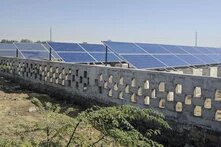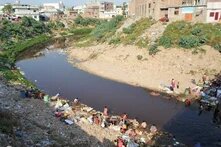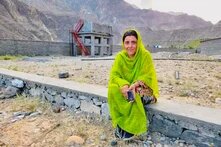
Pakistan’s green startups are driving change but need long-term support to thrive

Pakistan, a South Asian country of 230 million people, has experienced several extreme weather events despite being one of the world’s lowest carbon emitters. The climate wake-up call came in the summer of 2022 when catastrophic floods killed approximately 1,700 people, affected 33 million, and left one-third of the country under water. Recent heat waves, floods, and droughts have underscored the immediate and direct threat that the climate crisis poses to lives and livelihoods. Experts have called the floods “a wake-up call for urgent action to prevent further devastation”.
In response to the risks posed by the climate crisis, Pakistani startups have emerged as key players in promoting green initiatives and environmentally sustainable practices. Sustainability simply means meeting our needs without harming the ability of future generations to meet theirs. However, despite the growing recognition of the importance of sustainability, many of these green startups are facing challenges, such as limited access to funding and resources, as well as resistance to change in society. Although progress is slow, the conversation around sustainability has finally begun in Pakistan, and the trend is growing, with more green startups combining good faith and technology to build a more sustainable future.
Tackling textile waste
Pakistani startup Datini Fibres is working on a sustainable recycling mechanism for the textile industry to reduce water, air, and solid waste pollution caused by it. Pakistan’s textile industry is central to the economy, accounting for 60 per cent of the country’s exports, according to official data. However, it is also a major source of pollution with untreated waste flowing into the groundwater. Moreover, the import of used clothing worsens the textile waste crisis in Pakistan, with a significant quantity of it eventually finding its way to landfills. Pakistan was among the third largest importer of used clothing in the world in 2020, according to Observatory of Economic Complexity (OEC). The use and import of secondhand clothes are currently on the rise due to high inflation as imports of used clothing increased by nearly 47 per cent in the first 11 months of the fiscal year 2022 compared to the same period last year. However, a large portion of it also ends up in landfills. This is a global issue with an estimated 92 million tonnes of textiles disposed of annually of which just 12 per cent is recycled, according to published reports.
Realising the extent of the textile waste crisis, a Pakistani startup has made it its mission to recycle post-consumer waste and introduce a solution that turns waste into value. Datini Fibres is a materials science company that aims to transform global post-consumer wool waste into new recycled wool fibres to create premium, renewable textiles.
Hasnain Lilani, who has worked in the textile industry as a researcher and innovator for a decade, left his high-earning job in 2016 to pursue his vision of a future focused on sustainable and circular textile products, services, and business models. “Six years ago, no one in Pakistan was talking about climate change, its implications and the measures necessary to adapt to it,” he said.
Inspired by his vision to encourage change in the textile industry, Lilani and three of his fellows, Kumail Virani, Hasan Virani and Aqeel Virani, began working to introduce textile recycling processes in Pakistan. “Unfortunately, the industry and the people were not prepared back then. We found no support. No one wanted to invest in research, innovation and sustainability. The focus was only on making more profits,” he said.
Though disappointed, the four entrepreneurs were not ready to give up. “We started small and initially worked with one of the biggest chemical recycling plants in Sweden, supporting their textile waste recycling pilot project by shipping materials from Pakistan,” he added. This project became the basis of Datini Fibres, launched in 2019. But then came the challenging era of COVID-19, which slowed and impacted all industries around the world.
Step by step, they recovered and signed partnerships with companies in Europe. Now they have collaborations in Italy, Germany, Japan, and even Pakistan where textile companies are utilising their expertise to collect, sort, and process textile waste for mechanical recycling and transformation of fibres to turn old clothing into reusable fibres to create new garments. Nearly 90 per cent of the materials used are turned into new fibres by the startup, they say. Datini Fibres is named after Francesco Di Marco Datini, the 14th century merchant and banker from Prato, a central Italian city and the largest textile centre in Europe. Datini, known for his exceptional record of business affairs, was called the “Merchant of Prato”.
Fast fashion, sustainability and circular economy
The Karachi-based startup aims to transform hundreds of textile factories in Pakistan, which is a fast-fashion powerhouse. Fast fashion offers trendy clothes at an affordable price but it comes at an environmental and social cost. Many popular fashion brands, including Zara, H&M, Next, Mango, Forever 21, Nike, Adidas, and others, have outsourced their clothing production to Pakistan.
But this growing fashion industry is the world’s second-most-polluting sector, says the UN. It is also the second most water-intensive industry. The global average water required to grow 1 kg of cotton is 10,000 litres, only enough to produce a pair of denim jeans. In comparison, a person would take 10 years to drink 10,000 litres of water, according to a 2018 report titled “UN helps fashion industry shift to low carbon”.
Studies show that today less than one per cent of textile waste is fibre-to-fibre recycled globally due to several barriers. Yet some brands are inspiring change. In 2020, Swedish fast fashion brand H&M became the first to begin using Circulose, a new fibre made from discarded textile waste. It was described as “a major milestone for the industry” by Patrik Lundström, CEO of Renewcell, the Swedish textile recycling innovator collaborating with H&M Group for recycled textiles. In 2021, the fashion company claimed to have tripled the use of recycled materials in their products and set an ambitious goal of reaching 30 per cent by 2025. However, H&M has also faced criticism for its environmental and social practices, with some accusing the company of ‘greenwashing’ over misleading claims about its sustainability practices. Despite that, several global fashion brands including Levi’s, Eileen Fisher, Patagonia, For Days and Reformation are now using sustainable clothing.
This is what Datini Fibres aims to implement in Pakistan to promote sustainable fashion and reduce the environmental impact of clothing production. The startup aspires to revolutionise the Pakistani textile industry by promoting a circular economy that prioritises the reuse, recycling, and redesigning of products to tackle the colossal waste problem and minimise the use of Earth’s natural resources.
Datini Fibres has made its mark but it is still in bootstrapping mode, relying on its own savings and revenues to operate and grow. “We are trying our best. We know we are on the track and we will definitely change the game slowly and surely,” said Lilani.
However, he said that government-level support was critical to implement advanced solutions. “Without support and funds, it will be difficult to continue,” he added.
If the textile recycling startup secures funding, it will incorporate technologies such as robotics and artificial intelligence (AI) for advanced, accurate, and automated fibre sorting and preprocessing. So far, Datini Fibres has only received recognition from Islamabad-based National Incubation Centre (NIC) Pakistan, which supports and mentors startups and entrepreneurs, when it was shortlisted for the accelerator programme, which the co-founder says was “a very useful learning experience”. Leading consulting firm McKinsey & Company has identified critical scale, collaboration, transition funding, investments and public-sector push as the main ingredients for success in textile recycling.
Combating plastic pollution
As the world confronts the challenge of textile waste, another crucial environmental concern and pressing issue is plastic pollution. Plastics pose a more imminent threat because of their long-lasting nature and difficulty of disposal. Tackling the plastic pollution crisis is no small feat in a country, which produced 3.9 million tonnes of plastic waste in 2020, of which 70 per cent was mismanaged and most ended up in landfills.
A Pakistani startup called Green Plastic is addressing this massive problem by giving discarded potato peels a second life. The Rawalpindi-based startup aims to reduce waste by turning potato peels into a valuable product – an eco-friendly and biodegradable plastic bag that can be used for a variety of purposes and can replace the regular plastic bag (made from a polymer known as polythene) in the packaging and textile industry, supermarkets and shopping malls.
Maria Qayyum, a 24-year-old student of environmental sciences at Fatima Jinnah Women University, said she always wanted to reduce the excessive use of petrochemical plastic and replace it with biodegradable plastic. “As an environmental science student, I kept thinking of ways to cut plastic pollution because of the poor waste management infrastructure in Pakistan,” she said. “Plastic is cheap but recycling is expensive. The only solution is a plastic bag, which is biodegradable so that there is no plastic pollution in the first place.”
The project began in 2020 as part of her BSc degree thesis. Qayyum worked on her research paper on plant-based plastic with her professors, Noshabah Tabassum and Uzaira Rafique, who are now the co-founders of the project called Green Plastic. “I graduated soon after writing the paper in 2020. Fortunately, our project won Pakistani rupees (PKR) 1.7 million ($7500) in funding at the university’s office of research, innovation, and commercialisation to pursue the idea further. My supervisor then hired me as a research assistant on the same project, which I am continuing along with my MPhil degree,” she said. Since then, Green Plastic has been selected among the top startups in different competitions across the country and also won a small grant from the National Cleaner Production Centre (NCPC).
From potato peel to bioplastic bag
The key ingredient utilised by the startup is the peel waste of potatoes, which is the world's fourth most important crop after rice, wheat, and maize. Globally, several starch-based bioplastics have been developed by researchers to reduce pollution and reliance on petroleum-based products and tackle plastic pollution, which has become one of the major environmental challenges of the century.
The bioplastic bag developed by the Pakistani startup is “durable and strong” and will decompose into nutrients for the soil only in six months when it ends up in nature, far quicker than a traditional plastic bag that can take up to 1,000 years to decompose. Even then, the polythene bag breaks down into microplastic, which pollutes the environment and is especially toxic to living creatures in the sea.
According to Qayyum, turning potato peels into a plastic bag is a three-step process. Initially, the potato starch is extracted through the use of specialised extraction machines, which segregate the starch from the potatoes and procure it in its pure form. This extracted starch is then subjected to extrusion, during which it is molded into small beads. These starch-based beads are used to create bags using the blown film machines. This process results in a biodegradable and environmentally sustainable substitute to conventional plastic bags.
While the startup has only conducted lab scale experimentation, they assume the production cost of potato peel plastic bags to be around PKR 100-120 ($0.5) per kg and will cost almost the same as the normal plastic bags. “This cost can be further reduced if we have the raw materials available locally and extraction is done using local machinery,” Qayyum said. The startup is currently raising funds to set up the infrastructure to extract raw materials from waste locally. “My university has already promised us the building, so now we need the funding of PKR 20.5 million (US$90,250) for a fully developed setup to begin production within a few months,” she added.
Long-term policymaking on sustainability – missing piece?
Green startup owners feel there are not many incentives and grants for those working for sustainable development. According to latest statistics, financial technology (fintech) and e-commerce remain the most funded industries in Pakistan. These two sectors attracted most of the funding in 2022 as Pakistani startups raised $347 million, according to data from Data Darbar that tracks investment flows into the country’s tech ecosystem.
“More than support from the government, the Pakistani economy needs policies that support startups, create jobs, drive growth and innovation,” said Nadeem ul Haque, vice chancellor of Islamabad-based Pakistan Institute of Development Economics (PIDE), an autonomous research organisation funded by the government.
According to him, young startups have the passion and will to introduce innovative solutions but often find no support from the government. “We need sustainable housing and mobility. But can startups alone change public behaviour without government policies?” he said. Even if startups take the initiative on their own, the implementation still requires “long-term policymaking for sustainable growth by the government”.
Some experts say that funding for climate tech startups will gain traction in the next few years as this period is crucial to achieving ambitious climate goals for 2030 under the Paris Agreement. The recent extreme climate events, particularly the cataclysmic floods of 2022 that submerged one-third of Pakistan and affected 33 million people, have also prompted the conversation to build climate-resilient communities. “There has been a significant interest in climate tech startups after the unfortunate floods that showed Pakistan’s high vulnerability to climate change despite contributing less than one [1] per cent of global greenhouse gas emissions,” said Parvez Abbasi, project director at NIC that supports and mentors young technology entrepreneurs to help build and scale startups. “NIC would definitely encourage and support more climate startups”, he said, adding that this was the moment to shine for green startups as everyone from the government to investors and policymakers were in agreement to support climate action.
Role of national incubation centres
There are only a handful of climate tech startups in Pakistan, but the number is growing. In the last four years, Pakistan’s NIC came across “some exciting startups in diverse areas such as reducing water wastage in agriculture, optimising solar energy use for homes and farms, developing e-vehicle batteries, and developing biodegradable plastic, which is very encouraging,” said Zouhair Khaliq. Khaliq is the co-founder and partner of Teamup, which is managing NIC. Established in 2016, NIC was built under a public-private partnership among the Ministry of Information Technology and Telecommunication, Teamup, Jazz and Ignite Technology Fund (by telecom operators in Pakistan, which are required by law to contribute 0.5 per cent of their annual revenues to this fund). There are now seven NICs in Islamabad, Lahore, Karachi, Quetta, Peshawar, Faisalabad, and Hyderabad.
By 2021, 77 per cent of the startups incubated are still in business, creating around 10,000 jobs, and NIC generated nearly PKR 3 billion in revenues and investments for the startups. Khaliq is “very optimistic” about the potential of the Pakistani startups. In the last 30 months, Pakistani startups have received some $750 million of venture capital funding, which is “a promising number” and shows that the “interest is continually increasing” despite all issues — both internal economic and political issues as well as the global recession fears and the ongoing war in Ukraine.
“The Pakistani startup ecosystem is at a very interesting inflection point where we are set to grow very rapidly over the next three to five years. The talent and innovation is there. The funding is beginning,” Khaliq said. While these startups continue to face administrative obstacles among other issues, Khaliq said that “it is very important to start looking at the startup ecosystem as the next potential growth engine” for Pakistan — a country of 230 million people with an estimated 60 per cent below the age of 30.
Startups and entrepreneurship experts say the challenges are myriad and complex but they believe there is hope for change. This change cannot come from a single sector but requires a comprehensive system that integrates a circular economy model, industrial and consumer participation, flexible government policies, and involvement of the private sector and non-traditional partners such as local communities, academia, innovators, engineers, social scientists, and other experts.






